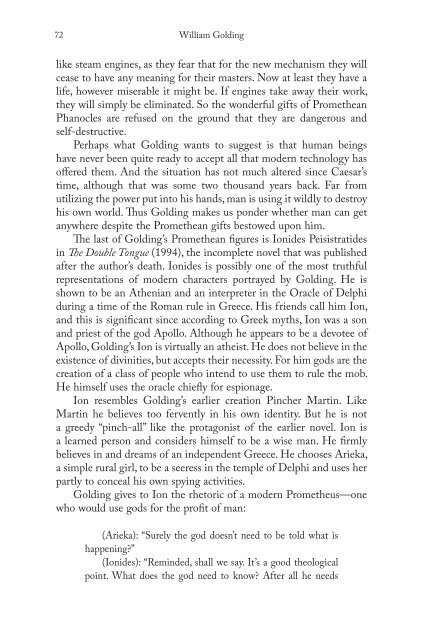Blooms Literary Themes - THE TRICKSTER.pdf - ymerleksi - home
Blooms Literary Themes - THE TRICKSTER.pdf - ymerleksi - home
Blooms Literary Themes - THE TRICKSTER.pdf - ymerleksi - home
You also want an ePaper? Increase the reach of your titles
YUMPU automatically turns print PDFs into web optimized ePapers that Google loves.
72<br />
William Golding<br />
like steam engines, as they fear that for the new mechanism they will<br />
cease to have any meaning for their masters. Now at least they have a<br />
life, however miserable it might be. If engines take away their work,<br />
they will simply be eliminated. So the wonderful gifts of Promethean<br />
Phanocles are refused on the ground that they are dangerous and<br />
self-destructive.<br />
Perhaps what Golding wants to suggest is that human beings<br />
have never been quite ready to accept all that modern technology has<br />
off ered them. And the situation has not much altered since Caesar’s<br />
time, although that was some two thousand years back. Far from<br />
utilizing the power put into his hands, man is using it wildly to destroy<br />
his own world. Th us Golding makes us ponder whether man can get<br />
anywhere despite the Promethean gifts bestowed upon him.<br />
Th e last of Golding’s Promethean fi gures is Ionides Peisistratides<br />
in Th e Double Tongue (1994), the incomplete novel that was published<br />
after the author’s death. Ionides is possibly one of the most truthful<br />
representations of modern characters portrayed by Golding. He is<br />
shown to be an Athenian and an interpreter in the Oracle of Delphi<br />
during a time of the Roman rule in Greece. His friends call him Ion,<br />
and this is signifi cant since according to Greek myths, Ion was a son<br />
and priest of the god Apollo. Although he appears to be a devotee of<br />
Apollo, Golding’s Ion is virtually an atheist. He does not believe in the<br />
existence of divinities, but accepts their necessity. For him gods are the<br />
creation of a class of people who intend to use them to rule the mob.<br />
He himself uses the oracle chiefl y for espionage.<br />
Ion resembles Golding’s earlier creation Pincher Martin. Like<br />
Martin he believes too fervently in his own identity. But he is not<br />
a greedy “pinch-all” like the protagonist of the earlier novel. Ion is<br />
a learned person and considers himself to be a wise man. He fi rmly<br />
believes in and dreams of an independent Greece. He chooses Arieka,<br />
a simple rural girl, to be a seeress in the temple of Delphi and uses her<br />
partly to conceal his own spying activities.<br />
Golding gives to Ion the rhetoric of a modern Prometheus—one<br />
who would use gods for the profi t of man:<br />
(Arieka): “Surely the god doesn’t need to be told what is<br />
happening?”<br />
(Ionides): “Reminded, shall we say. It’s a good theological<br />
point. What does the god need to know? After all he needs

















